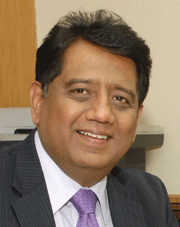 Dilip Thakore interviewed Raj Grover, chief exe-cutive of Rumi Education Pvt. Ltd in Hyderabad. Excerpts:
Dilip Thakore interviewed Raj Grover, chief exe-cutive of Rumi Education Pvt. Ltd in Hyderabad. Excerpts:
What are the socio-economic factors which prompted Rumi to focus upon the affordable schools segment?
Rumi Education is the dream and vision of our founder Richard F. Chandler, promoted with the mission to ‘build prosperity for tomorrow’s world’. Everything we do revolves around this mission statement.
In Rumi Education, we believe the answer is to empower learners, nurture creativity, build alternative skills and improve the employability quotient of all children. If we succeed in doing this, the dreams of every middle-income family will be realised and eventually lead to true transformation at society and national levels.
What are your plans of going rural?
The problems and challenges of school education are all-pervasive and impact both urban and rural schools. However, it’s important to note that almost 50 percent of our school partners are in tier II-IV towns.
Who are your target customers and what is the range of services that you offer them?
Our core target is students from nursery to class X. But to enable and empower them, we engage with the entire ecosystem i.e school manage-ments, teachers and parents.
Essentially we work as academic partners of existing schools, complementing the existing curriculum with innovative pedagogy practices to improve teaching-learning outcomes. We also offer special programmes that focus on concept clarity, spoken English and personality development. Moreover, we provide pre-primary curriculums and digital skills development which is far ahead of the typical IT education and pre-school programmes currently available.
But our key differentiator is intensive teacher empowerment programmes designed for effective implementation. This is followed up with rigorous continuous assessments to measure learning improvement.
What in your opinion are the root problems of iIdian education, especially school education?
School education needs to address the challenges students will face in 2030. With the advent of technology many professions and skills will continue to become obsolete. Students need to be groomed to adapt to constant change. This burning need, if left unaddressed, could have serious repercussions.
Great academic institutions are built on great pedagogical practices and a scientific approach to academics. This forms the DNA of schools. It has to work in perfect harmony and be consistent across all classes and subjects. Academics is a specialised subject and my appeal to all educational institutions is to seek help of experts in this area. This is at the core of Rumi programmes and our entire academic and teacher support system.
Rumi Education began operations in 2008. What has been the response of your target group customers? How satisfied are you with your progress thus far?
The response has been overwhelming. With peer referrals and one-on-one engagement, we have built a network of 100-plus partner schools, far exceeding learning improvement targets across many programmes. Schools report improved attendance, more engaged classrooms, improved teacher retention and motivation. Our greatest joy however is happy parents sharing their experiences of smarter, more expressive children. While we have a long way to go, we are very satisfied with the early response.
What are the medium and long-term plans of rumi education?
At a conservative estimate India hosts 70,000 private unaided schools. In the medium term, we are looking for a reasonable share of this market. The need for improved teaching practices and learning outcomes in government schools is also an urgent national priority. Therefore the long-term outlook of Rumi Education is very bright.
Our larger goal and wider vision is to learn from our Indian experience and replicate the model across developing countries. This makes Rumi Education a global venture. This is our promoter’s ultimate dream and vision.